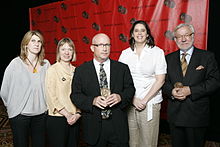Taxi to the Dark Side
[1] It focuses on the December 2002 killing of an Afghan taxi driver named Dilawar,[2] who was beaten to death by American soldiers while being held in extrajudicial detention and interrogated at a black site at Bagram air base.
The documentary concerns the death of Dilawar, an Afghan peanut farmer, who gave up farming to become a taxi driver and who died after several days of beating at Bagram detention center.
On 1 December 2002 he and three passengers were handed over to US military officials by a local Afghan warlord, accused of organising an attack on Camp Salerno.
The film explores the background of increasingly sanctioned torture following 9/11 in contravention of the Geneva Convention and looks at the exposure of Abu Ghraib.
The documentary claims that of the over 83,000 people incarcerated by US forces in Afghanistan up to 2007, 93 percent were captured by local militiamen and exchanged for US bounty payments.
[10] In his acceptance speech for the "Best Documentary Feature" Academy Award, Gibney said: This is dedicated to two people who are no longer with us, Dilawar, the young Afghan taxi driver, and my father, a navy interrogator who urged me to make this film because of his fury about what was being done to the rule of law.
[10][11]It also won a Peabody Award in 2007 "for its sober, meticulous argument that what happened to a hapless Afghani was not an aberration but, rather, the inevitable result of a consciously approved, widespread policy.
[citation needed] In June 2008, Gibney's company filed for arbitration, arguing that THINKFilm failed to properly distribute and promote the film following its release and Oscar win.

